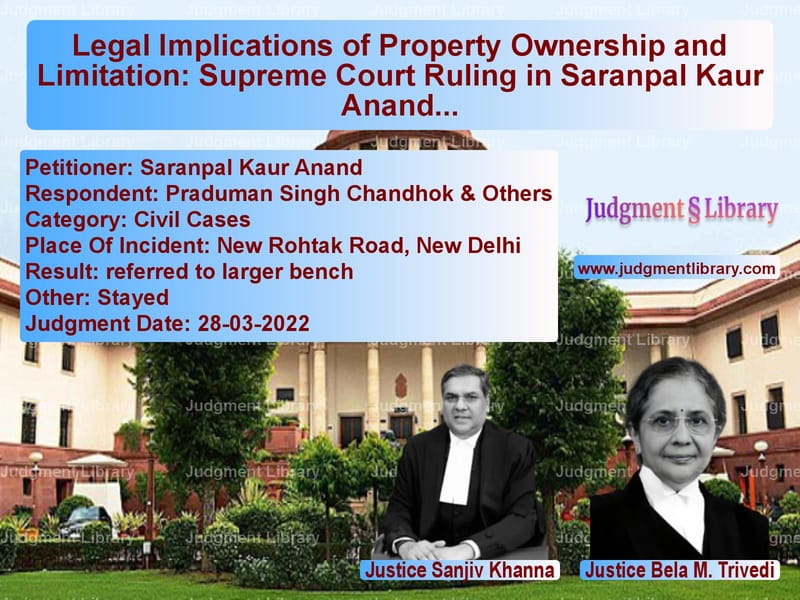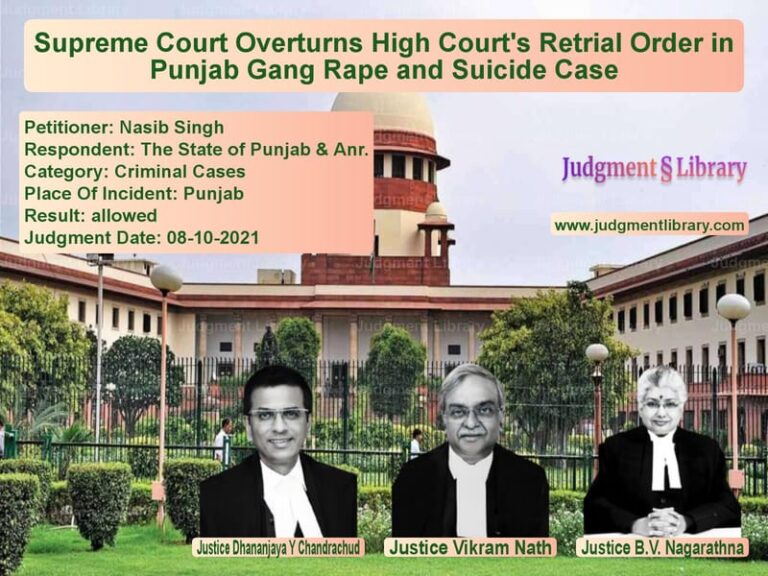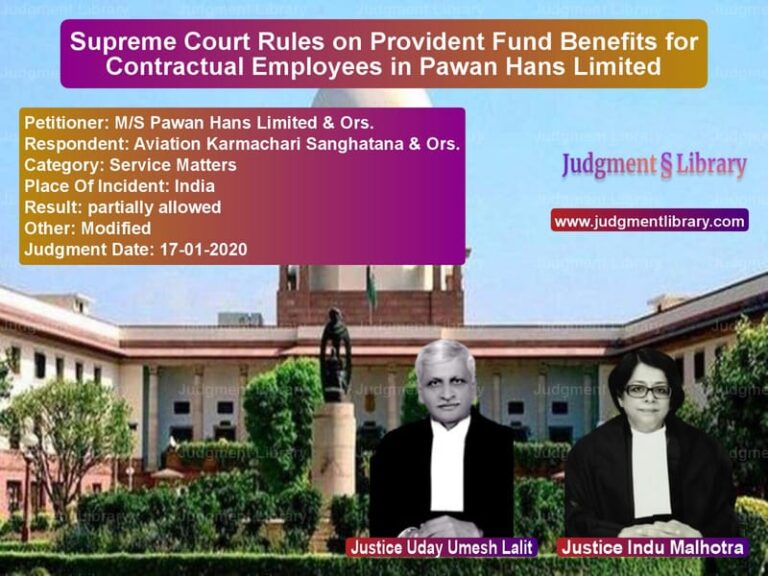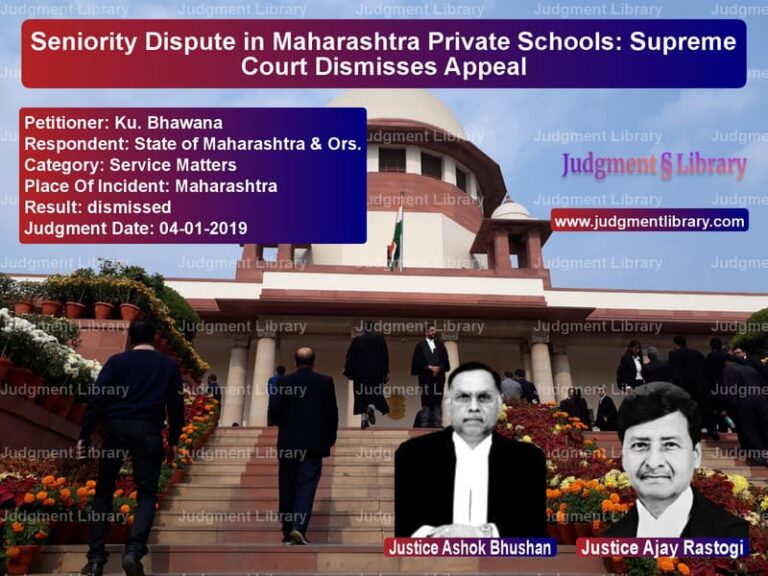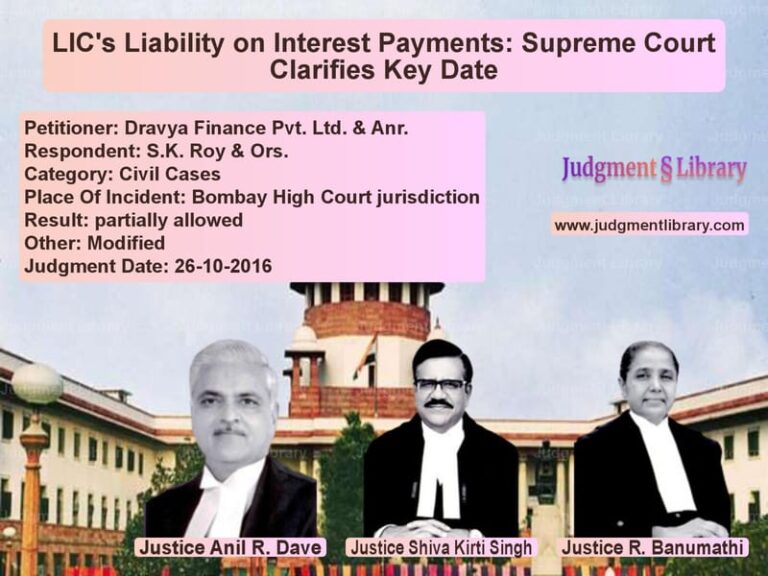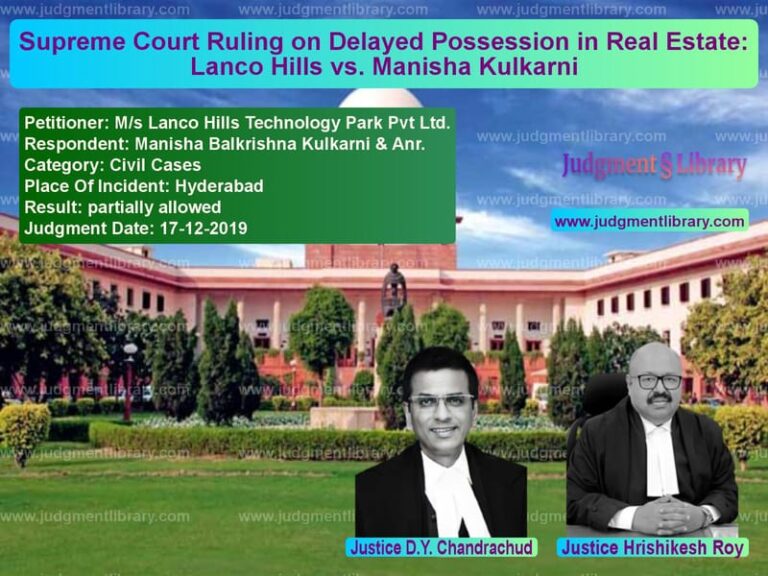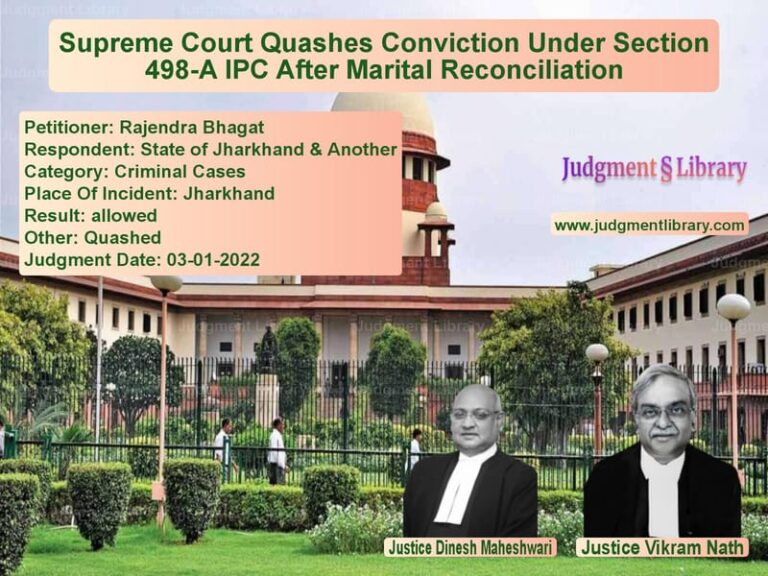Legal Implications of Property Ownership and Limitation: Supreme Court Ruling in Saranpal Kaur Anand vs. Praduman Singh Chandhok
The case of Saranpal Kaur Anand vs. Praduman Singh Chandhok & Others involves an intricate legal battle over property ownership and the impact of limitation laws in civil suits. The Supreme Court had to determine whether a property dispute, raised decades after the original sale, was barred by limitation and whether amendments to the plaint could be allowed.
Background of the Case
The appellant, Saranpal Kaur Anand, filed a civil suit seeking multiple declarations regarding the ownership of a property located at 4-C/7, New Rohtak Road, New Delhi. The key issues raised in the suit were:
- A declaration that the suit property was a joint undivided family property belonging to the plaintiff and defendants 3 to 9.
- A declaration that the sale deed dated August 23, 1969, executed by the plaintiff’s mother, Harbans Kaur, in favor of Tej Kaur, was fraudulent, fictitious, and void.
- A declaration that the subsequent sale deed dated October 12, 1995, executed by Tej Kaur in favor of defendant 2, Pervinder Singh Chandhok, was also void.
- A permanent injunction restraining the defendants from making alterations, selling, or creating third-party interests in the property.
The defendants challenged the suit, arguing that it was barred by limitation since it was filed in 2012, nearly 42 years after the first sale deed and 17 years after the second sale deed. They also filed an application under Order VII Rule 11(d) of the Code of Civil Procedure (CPC) seeking rejection of the plaint on the ground of limitation.
Petitioner’s Arguments (Saranpal Kaur Anand)
The petitioner contended:
- The sale deeds were executed through fraud and concealment, and therefore, limitation under Section 17 of the Limitation Act should apply.
- She and her family members were kept in the dark about these transactions and discovered the fraud only recently.
- The sale deed of 1969 was a benami transaction, and her mother had no authority to transfer ownership.
- She sought amendments to the plaint to include recovery of possession and further details about the fraud.
Respondent’s Arguments (Praduman Singh Chandhok & Others)
The respondents argued:
- The sale deeds were legally executed and registered documents, and no objections were raised for decades.
- The plaintiff’s legal notices in 2008 acknowledged the ownership of Tej Kaur, proving she was aware of the transactions.
- The suit was clearly barred by limitation under Article 58 of the Limitation Act, which prescribes a three-year period from when the right to sue first accrues.
- Amendments to the plaint were sought only to overcome the limitation issue and were therefore mala fide.
Supreme Court’s Observations
The Supreme Court analyzed the key legal aspects:
- Order VII Rule 11(d) CPC: A plaint can be rejected if, from its statements, it appears that the suit is barred by any law, including limitation.
- Article 58 of the Limitation Act: A suit for declaration must be filed within three years from when the right to sue accrues.
- Section 17 of the Limitation Act: Fraud must be specifically pleaded and supported by facts to justify an extension of limitation.
The Court stated:
“Even prior to 2008, the plaintiff was aware of the execution and transfer of ownership rights in favor of late Tej Kaur via the sale deed dated 23rd August 1969. The claim that she recently discovered the fraud is not supported by the documents she has relied upon.”
Read also: https://judgmentlibrary.com/supreme-court-upholds-specific-performance-in-land-sale-dispute/
The Court further observed that:
- The plaintiff had accepted the possession and ownership of Tej Kaur in her 2008 legal notices.
- The limitation period for challenging the 1969 sale deed expired decades ago, and no valid reason was given to justify an extension.
- Allowing amendments to introduce new claims would not revive a time-barred suit.
Final Judgment
The Supreme Court issued a split verdict:
- Justice Sanjiv Khanna upheld the High Court’s decision, affirming that the suit was barred by limitation and the plaint was rightly rejected.
- Justice Bela M. Trivedi dissented, arguing that the High Court erred in rejecting the plaint at the preliminary stage without allowing evidence to be presented.
- Due to the split decision, the matter was referred to a larger bench for final adjudication.
Key Takeaways from the Judgment
- Limitation Laws Must Be Strictly Applied: A suit filed decades after the alleged fraudulent transaction will be dismissed unless there is clear proof of recent discovery.
- Fraud Claims Require Strong Evidence: Simply alleging fraud is insufficient; specific facts and timelines must be provided.
- Legal Notices Can Impact Future Claims: Statements made in past legal notices can be used as evidence of knowledge and acceptance.
- Amendments Cannot Revive Time-Barred Suits: Courts will reject amendments if they are clearly aimed at overcoming limitation issues.
- Split Judgments May Require Larger Benches: In case of disagreement between judges, a larger bench may be needed for final resolution.
Conclusion
The Supreme Court’s ruling in this case underscores the importance of timely legal action and the necessity of clear evidence when alleging fraud. While the case remains pending before a larger bench, the decision serves as a crucial reminder that claims involving property disputes must be raised within the prescribed legal timeframe, and plaintiffs cannot indefinitely delay action under the pretext of late discovery.
Petitioner Name: Saranpal Kaur Anand.Respondent Name: Praduman Singh Chandhok & Others.Judgment By: Justice Sanjiv Khanna, Justice Bela M. Trivedi.Place Of Incident: New Rohtak Road, New Delhi.Judgment Date: 28-03-2022.
Don’t miss out on the full details! Download the complete judgment in PDF format below and gain valuable insights instantly!
Download Judgment: saranpal-kaur-anand-vs-praduman-singh-chand-supreme-court-of-india-judgment-dated-28-03-2022.pdf
Directly Download Judgment: Directly download this Judgment
See all petitions in Property Disputes
See all petitions in Contract Disputes
See all petitions in Damages and Compensation
See all petitions in Specific Performance
See all petitions in Succession and Wills
See all petitions in Judgment by Sanjiv Khanna
See all petitions in Judgment by Bela M. Trivedi
See all petitions in Referred to Larger Bench
See all petitions in Stayed
See all petitions in supreme court of India judgments March 2022
See all petitions in 2022 judgments
See all posts in Civil Cases Category
See all allowed petitions in Civil Cases Category
See all Dismissed petitions in Civil Cases Category
See all partially allowed petitions in Civil Cases Category

